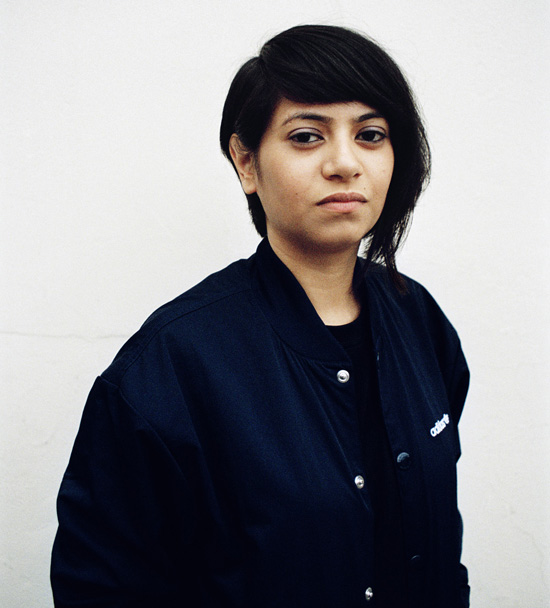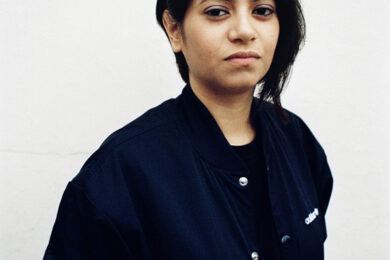Photo by Georg Gatas
Is flying still the future? According to John D. Kasdara and Greg Lindsay, the authors of Aerotropolis: The Way We’ll Live Next, cities will soon be built around airports, allowing for seamless, non-stop global connectivity. But for now, planes fly from suburban neighbourhoods on the fringes, and these areas feed on the airports they encircle. One such place is Feltham, a ten-minute drive from Heathrow, and home to Sara Abdel-Hamid, aka Ikonika.
Sitting in her garden studio to discuss her new album Aerotropolis, the array of synths and hardware behind her are a reminder of how her productions have evolved over the past five years. When the first Ikonika single, the spare, mournful ‘Please’, was released on Hyperdub in 2008, she was part of a vanguard of artists on the label – Zomby, Darkstar, Quarta330 – taking dubstep in new, unanticipated directions. On follow-up singles and her debut album, Contact, Want, Love, Have, she further explored her knack for crafting bright, busy 8-bit melodies that hinted towards chiptune and videogame soundtracks.
After a period focusing on DJing and running the Hum + Buzz label with occasional collaborator Optimum, Abdel-Hamid returns this month with a new album on Hyperdub, Aerotropolis. She’s now making widescreen music, more reminiscent of a sci-fi film than a videogame – for the album, she took inspiration from J.G. Ballard’s Concrete Island, set nearby, and the 1997 film Gattaca. "Vincent Freeman, Ethan Hawke’s character, his ambition is to get on these rocket launchers and be an astronaut, to get high," she declares. "And I really like that idea."
On some of the album’s earlier tracks, giddy, soaring synths give a sense of just how dizzying that kind of height could be, while ‘Beach Mode (Keep It Simple)’ and ‘Mr. Cake’ luxuriate in travel’s warm splendour. But as it progresses Aerotropolis takes on a darker intensity, hinting at the nightmare that this dream of flight could become. It’s a thrilling, epic ride, laced with some of the sadness that made Abdel-Hamid’s music compelling in the first place.
Around the time of the last album, you said you had a very stripped-down sound and that was a kind of challenge. You’ve opened up with Aerotropolis. Is that a challenge in itself, having all these options?
Sara Abdel-Hamid: Yeah, in a way, just trying to figure out how to meld it all together, all those different ideas and all those little sketches that I’d made. But I did make an effort on this one to try and use as much stuff as I could. I borrowed a Juno-106 [synthesiser] from Alex Bok Bok. And trying to use more effects and see how I far I could take those. There’s a track called ‘Let A Smile Be (Y)our Umbrella’, and the synths really feel like they’re moving away from the beat, they don’t want to stay in that groove and they really want to fall apart. And I just wanted the synths to have their own mind and run away from me, the human, and be on their own.
Something that’s obvious on this album is a glossiness and slickness. Was that what you were consciously going for?
SAH: I’ve always tried to really polish up my mixdowns and make my technical ability better, because I’m not musically trained. All the stuff I’ve learnt is purely from internet resources and talking to friends and reading magazines. So I’ve made a conscious decision to try and give [my music] a polished sound. But then when I thought I’d finished the album, Kode9 was like ‘No, you’ve kind of lost the rawness of it, you’ve lost the human element behind it’. And this was true. You couldn’t feel me twisting knobs or anything like that, you couldn’t feel my playing it. So I went back and started trying to dirty things up, make things a little bit grainy in some places.
How did you do that?
SAH: Trying to overuse effects, to burst reverb, to delay certain elements. Sharpen the drums a bit, distort them at times to give an analogue or tape effect. Steve [Goodman, aka Kode9] said ‘You don’t want to make a nostalgic album in 2013 [that sounds] too crisp, too perfect and too expensive and digital’, and this is very true. I feel kind of silly, because I tried to make it sound so professional and polished when really what I was doing before was perfectly fine, even if I didn’t know exactly what I was doing. So I’m very happy we went back and messed its hair a little.
The nostalgia comment is interesting, because what I like about the album is there’s an element that sounds futuristic, but there are some ’80s-feeling sounds to it. Being interested in the future seems almost old-fashioned at this stage.
SAH: The whole album is a fantasy of me being a lot older in the ’80s, and choosing music rather than videogames at that time. It’s funny to me that I didn’t really grow up at the right age at the right time. And if I had produced this album back in the late ’80s, would it sound the same or would it be different? I made an effort to use older equipment – like, I used a 707, I used Bok Bok’s Juno-106 a lot. It’s nice, as a producer who’s come from a computer-based background, to work with machines and see how the early producers did it.
Were you going back to the music of the 80s for inspiration?
SAH: Yeah, a lot of freestyle house. I’m really attracted to that genre because it was very melodic with these brass sounds, and at the same time had really nice dancey, housey, disco and sometimes hip hop beats from the drum machines. I just love the patterns. I was thinking, this music must have been amazing at the time.
Is Aerotropolis a title, or a concept to the album?
SAH: It’s a little of a concept, but it’s more of a subtext really. Because I’m here and you’re here in this studio, and we’re in Feltham, and we’re very close to Heathrow. And sometimes when it’s a bit quiet and if the planes are landing on a different runway, we’ll be able to hear them. I just go so into my surroundings, [especially] in the last two years. Because I was DJing a lot and flying out to different places, and I was thinking, I’m really lucky to be living ten minutes from Heathrow to go and do shows.
I feel sometimes very disconnected from the rest of London. Usually I’d have to go all the way to Old Street or Shoreditch to play or meet friends, and I’m like ‘Why can’t anyone come over here?’ It leaves me feeling a little bit sad, and I think it translated – particularly in the last half of this album, it turns from a summery vibe to this weird, paranoid, very alone atmosphere.
Something else I noticed is there’s a very strong sense of drama. It gets quite tense.
SAH: I think this relates to me still being scared of flying. I’m still very scared of turbulence. There’s always this thing in the back of my mind. Because I’m not in control, I’m not a pilot, and I just think, if I accidentally curse it in my head and think of bad things, the plane’s going to go down. But I’ve been working on it, and one thing that’s been helping me is to watch plenty of Air Crash Investigation episodes. Slightly weird for me to say that, but it still helps me now understand planes and aviation a lot more, and again ties in with the music, these stupid planes. There’s a few episodes that have named some of my tunes.
What have you learnt from running Hum + Buzz?
SAH: Not to do it! No, I’ve learnt to be very patient. I’ve learnt that I can’t have everything my way. But I’m working on that to make everything my way. It’s really hard to do, actually – I thought it would be a lot easier. Me and Optimum might try to do some more collaborative work together and release some of our tunes next year.
It’s really hard to say because we’re only five releases down and we take our time between releases. We don’t want to shout about it too much because it’s really not that kind of label – we want things to surface when they’re ready and naturally. People find it so much more satisfying when they can find things themselves, based on a certain time in their life that they’re going through, or something emotional, or they’ve been to a club and had the best time of their life. It’s all about experiences, really – you don’t want to ruin anyone’s experiences.
That emotional side, whether in your productions or in your own DJing, seems important to you.
SAH: Yeah, totally. I take DJing very seriously but not in a way where the set will become stiff and programmed. The one thing I’m scared about DJing is disappointing anyone. But at the same time I don’t want to crowd-please and become that DJ. For me it’s about sharing and a community vibe. Sometimes it doesn’t work – sometimes I feel very disconnected – but at least I can try and share something. It’s just important, because a club is like a church to me. It’s a place to meditate, it’s a place to find something new, it’s a place to remember something. I just like that idea of people really connecting in a club and the DJ being an important part of that.



